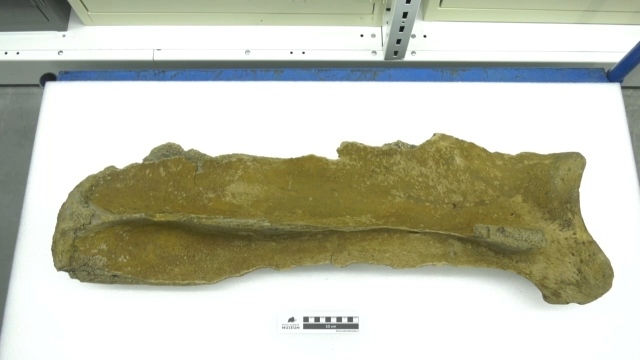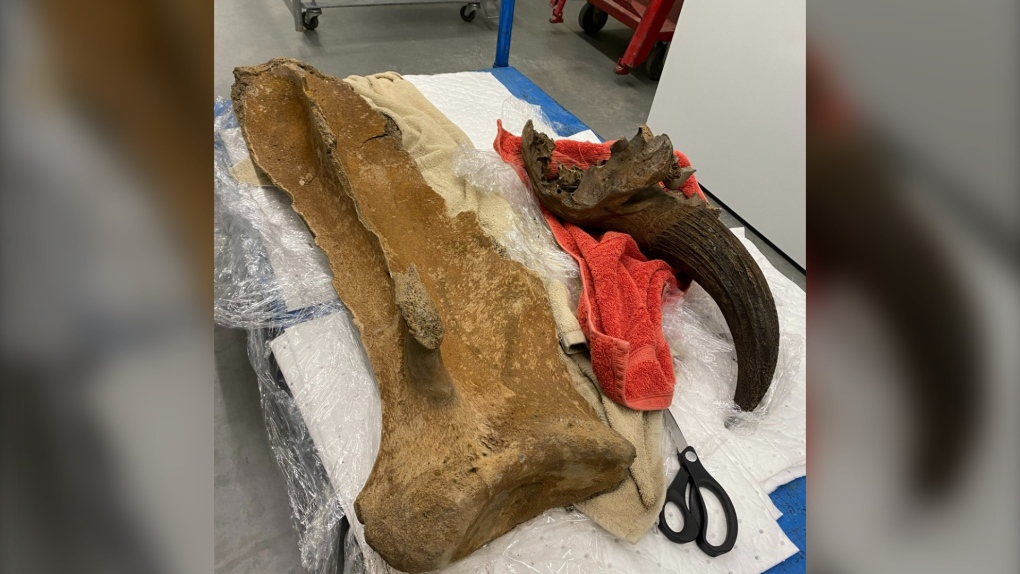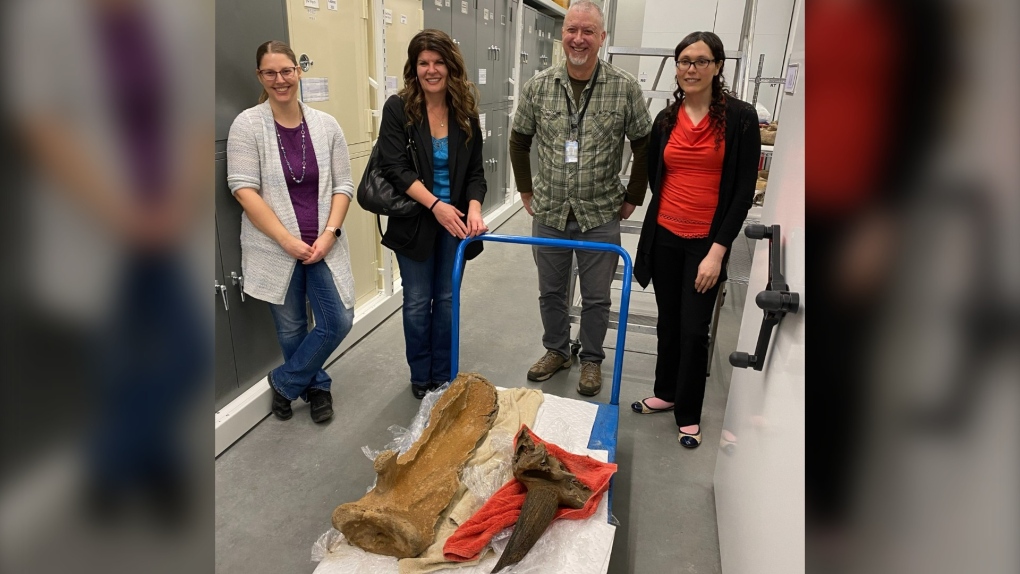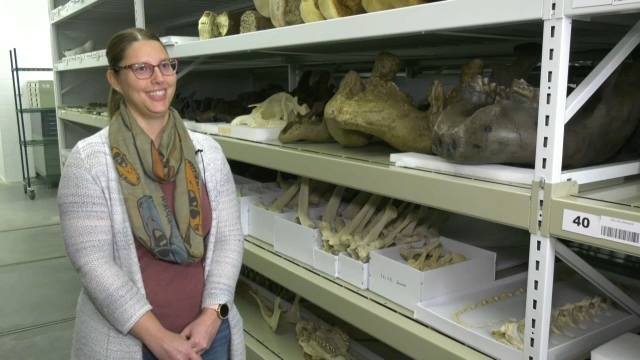Ice Age relic found by Alberta woman out walking her dogs
A chance discovery by an Edmonton area woman who was walking her dogs has turned out to be a massive fossilized bone that likely belonged to an Ice Age mammoth.
Stacy Long was walking out west of Devon last spring when she came across something jutting out of the river bank. That find has now been confirmed to be a fossil relic from the Ice Age, a potential scapula from an adult mammoth.
"On previous trips, there had been nothing," Long said. "This time, there was stuff coming out of the bank."
At first, she thought it was a large piece of wood. Long says she loves finding and collecting rocks for her garden.
"When I rinsed it off, it didn't look like wood anymore," she added. "So I thought, 'Oh, it might be something cool."
 A closeup of the shoulder blade Stacy Long found while walking her dogs west of Devon, Alta. (CTV News Edmonton/Darcy Seaton)
A closeup of the shoulder blade Stacy Long found while walking her dogs west of Devon, Alta. (CTV News Edmonton/Darcy Seaton)
She recalled how her husband was dubious at the time that she found anything exciting.
"I was a humanities teacher, not a science teacher," Long said. "He was just tired of me bringing rocks home for my flower bed."
"He was like, 'It's nothing,' but it ended up being something," she said with a laugh.
BUILDING THE PUZZLE OF ALBERTA'S HISTORY: RAM
She lugged the specimen home and sent a picture to the Royal Alberta Museum. After a series of emails, experts confirmed that Long had found a fossil that was just over a metre long. Long also came across a partial skull believed to be from a Bison antiquus from around the same era.
 The pair of fossils Stacy Long found while walking her dogs west of Devon last spring (Supplied).
The pair of fossils Stacy Long found while walking her dogs west of Devon last spring (Supplied).
Katherine Bramble, a RAM paleontologist, said the bone is believed to be a mammoth shoulder blade that is 10,000 to 14,000 years old. It has since been added to the museum's research and reference collection.
"We will be learning more about it from comparing it to other specimens, other mammoth bones, not just from her but elsewhere and that can tell us more about maybe what species it is," Bramble told CTV News Edmonton.
 Stacy Long (centre left) poses for a photo with Royal Alberta Museum staff, including paleontologist Katherine Bramble (far left) (Supplied).
Stacy Long (centre left) poses for a photo with Royal Alberta Museum staff, including paleontologist Katherine Bramble (far left) (Supplied).
What is now Alberta had two kinds of mammoths during the Ice Age, the larger but not as furry Columbian mammoth and the iconic woolly mammoth, Bramble explained.
Mastodons, which are more closely related to modern elephants, also lived in the area.
"It's too early to tell which species it could be," Bramble said.
For her, the find is exciting since mammoth and mastodon fossils are less common in Alberta when compared to dinosaur bones.
"What we have in the collections are teeth or tusk elements," she added. "We have a couple of arm or leg bones, but we don't have as much as we'd like to have."
Fossils, including the remains of plants and animals or traces of their activity, are protected in Alberta by the province's Historical Resources Act.
"By law, you are not allowed to dig for fossils if you find any," Bramble explained. "You need to have a permit for that."
"If you find something on the surface, you are allowed to collect it and take it home. Our preference would be that you get in contact with us and let us know what you found."
 Royal Alberta Museum paleontologist Katherine Bramble (CTV News Edmonton/Darcy Seaton).
Royal Alberta Museum paleontologist Katherine Bramble (CTV News Edmonton/Darcy Seaton).
Locating a different fossil like the one Long came across is helpful in building the puzzle of Alberta's natural history, Bramble said, like providing more details about where mammoths were living.
This spring, the museum plans to send a team to further probe the area where Long located the mammoth specimen in the hopes of finding more fossils.
"It just grows the story that we've been building over time about how Alberta looked in the Ice Age," Bramble said.
With files from CTV News Edmonton's Jeremy Thompson
CTVNews.ca Top Stories

'Anything to win': Trudeau says as Poilievre defends meeting protesters
Prime Minister Justin Trudeau is accusing Conservative Leader Pierre Poilievre of welcoming 'the support of conspiracy theorists and extremists,' after the Conservative leader was photographed meeting with protesters, which his office has defended.
What is changing about Canada's capital gains tax and how does it impact me?
The federal government's proposed change to capital gains taxation is expected to increase taxes on investments and mainly affect wealthy Canadians and businesses. Here's what you need to know about the move.
'My stomach dropped': Winnipeg man speaks out after being criminally harassed following single online date
A Winnipeg man said a single date gone wrong led to years of criminal harassment, false arrests, stress and depression.
Bank of Canada officials split on when to start cutting interest rates
Members of the Bank of Canada's governing council were split on how long the central bank should wait before it starts cutting interest rates when they met earlier this month.
'One of the single most terrifying things ever': Ontario couple among passengers on sinking tour boat in Dominican Republic
A Toronto couple are speaking out about their 'extremely dangerous' experience on board a sinking tour boat in the Dominican Republic last week.
7 surveillance videos linked to extortions of South Asian home builders in Edmonton released
The Edmonton Police Service has released a number of surveillance videos related to a series of extortion cases in the city now dubbed 'Project Gaslight.'
Ukraine uses long-range missiles secretly provided by U.S. to hit Russian-held areas, officials say
Ukraine for the first time has begun using long-range ballistic missiles provided secretly by the United States, bombing a Russian military airfield in Crimea last week and Russian forces in another occupied area overnight, American officials said Wednesday.
Pilot reported fire onboard plane carrying fuel, attempted to return to Fairbanks just before crash
One of the two pilots aboard an airplane carrying fuel reported there was a fire on the airplane shortly before it crashed and burned outside Fairbanks, killing both people on board, a federal aviation official said Wednesday.
Manitoba government tables bill to end ban on homegrown recreational cannabis
Manitoba is planning to lift its ban on the home growing of recreational cannabis.
































